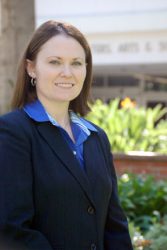
Drake University will host a free public lecture focusing on the underrepresentation of women and minorities in science, technology, engineering, and mathematics (STEM) fields. Bettina Casad, assistant professor in the Department of Psychological Sciences at the University of Missouri-St. Louis, will present “Underrepresentation of Women and Minorities in STEM and What We Can Do About It” at 6 p.m. Thursday, March 30, in the Reading Room of Drake’s Cowles Library, 2525 University Ave. A free reception with hors d’oeuvres will begin at 5:30 p.m.
Casad will draw on extensive neuroscience and social science research to explain how social and cultural factors are largely responsible for creating and maintaining disparities in gender and racial diversity in STEM. The lecture will feature evidence-based practices aimed at reducing achievement gaps and increasing diversity in STEM participation, and it will conclude with a discussion on activism, led by University of Missouri-St. Louis graduate student Anne Manwarring. The lecture is sponsored by the Slay Fund for Social Justice and Drake’s Department of Psychology and Neuroscience.
While on Drake’s campus, Casad will also deliver a student-focused lecture that examines the “Effects of Threatening Intellectual Environments on Women’s Success in STEM Majors: a Biopsychosocial Approach.” The lecture, which is open to Drake students, faculty, and staff members, will draw on Casad’s research to examine antecedents, mediators, and consequences of prejudice and discrimination for women in STEM. Casad’s studies highlight the need to use multiple methods, and to integrate theories from social psychology and neuroscience, to develop a deeper understanding of the causes and consequences of women’s underrepresentation in STEM.
Drake has made a major investment in the sciences with STEM@DRAKE, a $52 million initiative that includes the construction of two new academic buildings—both of which are set to be completed by fall 2017—and the introduction of six new academic programs. Together with four existing facilities, the new construction will create a six-building interdisciplinary hub for the sciences and serve as home to Drake’s School of Education, as well as the Robert D. and Billie Ray Center at Drake University.
Casad’s lectures will strengthen the STEM@Drake initiative by helping Drake students, faculty, staff members, and administrators, to understand modern research, theory, and practice necessary to create an inclusive environment for current and future STEM students, said Jill Allen, assistant professor in Drake’s Department of Psychology and Neuroscience.
“Addressing the barriers to equal access in STEM fields is an important social priority,” Allen said. “We are excited to bring Dr. Casad, who has an impressive track record in developing and implementing diversity interventions in STEM, to Drake’s campus and to offer opportunities for scholarly interaction, discussion, and networking around this critical topic.”

